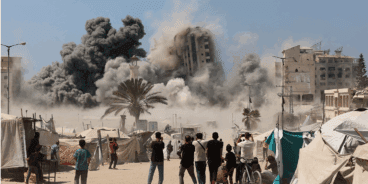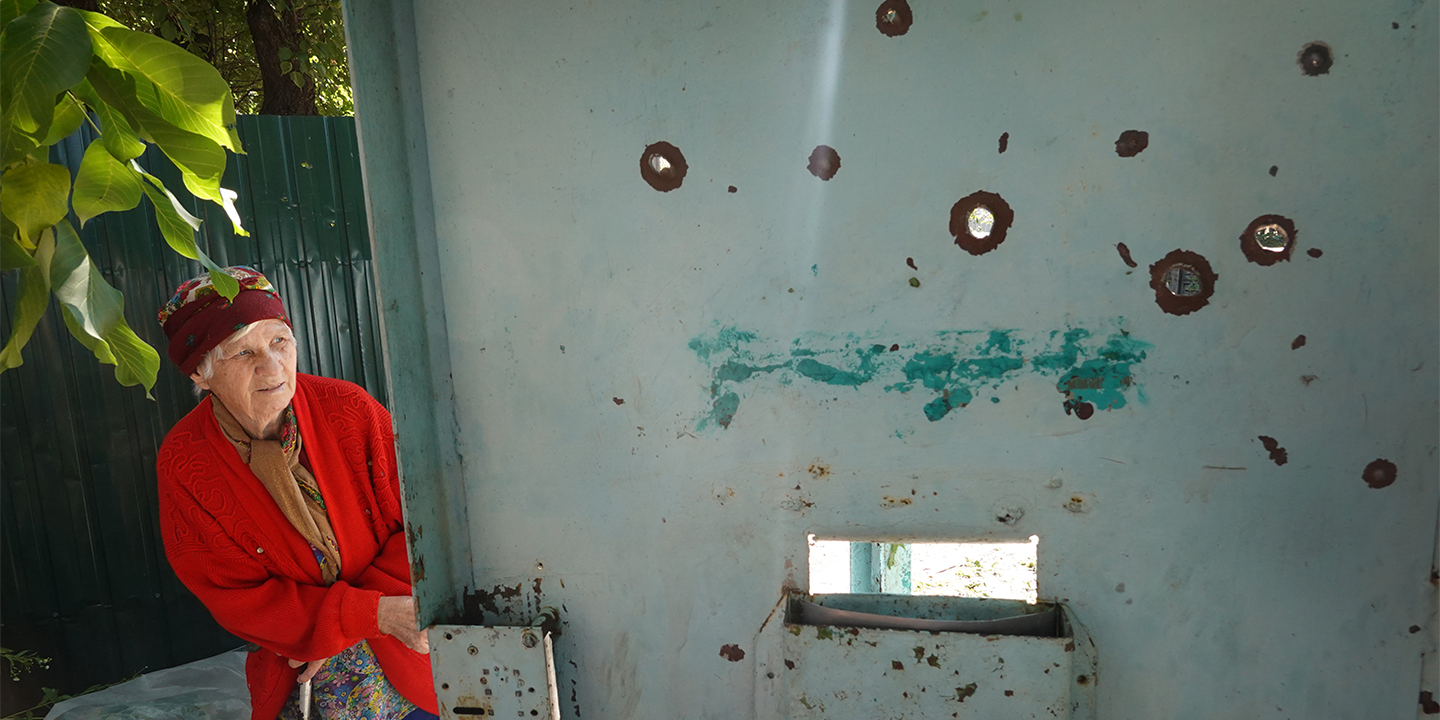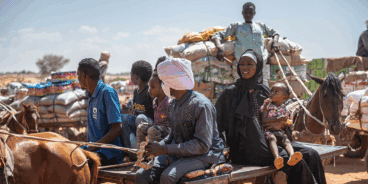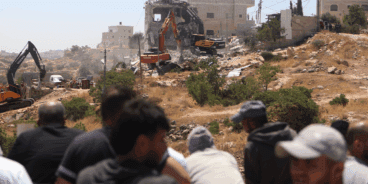

Atrocity Alert No. 355: Ukraine, Israel and the Occupied Palestinian Territory and Myanmar (Burma)
Atrocity Alert is a weekly publication by the Global Centre for the Responsibility to Protect highlighting situations where populations are at risk of, or are enduring, mass atrocity crimes.
DEADLY USE OF CLUSTER MUNITIONS IN UKRAINE
On 6 July Human Rights Watch released a report detailing the use of deadly cluster munitions in Ukraine by both Russian and Ukrainian forces since the start of the conflict in February 2022. The report documents Ukrainian forces utilizing cluster munitions on Russian-occupied areas around Izium in 2022, while Russian forces have utilized such munitions throughout the conflict. The evidence joins documentation by the UN Human Rights Monitoring Mission in Ukraine (HRMMU), released in March 2023, of the repeated use of cluster munitions around residential areas in Izium in 2022 killing multiple civilians, including attacks on a kindergarten where 250 people sought refuge and the city’s central market. According to the Landmine and Cluster Munitions Monitor, there were at least 689 casualties resulting from cluster munition attacks in Ukraine in the first half of 2022 alone, with many more likely unrecorded.
Cluster munitions remain an especially dangerous weapon of war due to their indiscriminate nature. Large munitions release dozens of bomblets that are dispersed over a wide area, with many often failing to immediately explode. Remaining where they fell, the unexploded munitions act like landmines for years to come, posing an extremely high risk to civilians who come across them unknowingly. The use of cluster munitions has effectively been banned since 2010 when the Convention on Cluster Munitions, signed by 123 states, went into force. Their use in civilian populated areas is categorized as an indiscriminate attack and is a violation of International Humanitarian Law that may amount to war crimes. Notably, neither Russia nor Ukraine have signed the Convention.
On 7 July the United States, which is also not a signatory to the Convention, announced it was moving forward with a plan to supply Ukraine with cluster munitions. While the United States government assured the international community the 20-year-old weapons have been improved to minimize their impact on civilians, international monitors worry the failure rate may still be unacceptably high. This announcement came as the international community marked the 500th day since Russia’s invasion on 24 February 2022.
The war continues to take an immeasurable toll on Ukraine’s civilians, with the HRMMU documenting over 9,000 civilians killed during the conflict, including at least 530 children, while recognizing the real toll to be much higher. The Global Centre for the Responsibility to Protect’s Executive Director, Savita Pawnday, said, “As we mark yet another grim milestone in this senseless war, the international community must take all steps to minimize additional harm to civilians. We strongly urge the United States to reconsider its decision to send more banned cluster munitions to Ukraine, which are guaranteed to pose a deadly threat to civilians for generations to come.”
ISRAEL’S RECENT ATTACK ON JENIN REFUGEE CAMP LIKELY AMOUNTS TO A WAR CRIME
Throughout 3-4 July Israeli forces killed at least 12 Palestinians, including five children, and injured more than 140 others in a large-scale military operation on Jenin city and Jenin refugee camp in the Occupied West Bank. Israeli forces launched airstrikes and ground operations, forcing thousands of Palestinians to flee and damaging civilian infrastructure, as well as hundreds of houses and apartment buildings. The Israeli authorities purportedly undertook the operation as an “extensive counter-terrorism effort.”
This attack was Israel’s biggest military operation in the Occupied West Bank in over 20 years. The UN Office for the Coordination for Humanitarian Affairs (OCHA) reported that the Israeli operation resulted in the highest number of Palestinian fatalities in a single operation in the Occupied West Bank since OCHA started recording casualties in 2005. As a result of the two-day attack, the UN Relief and Works Agency for Palestine Refugees in the Near East’s health center – which served the camp’s 24,000 residents – was destroyed.
Israel’s operation and its tactics targeting Jenin may constitute a war crime. Following the attack, several UN officials have unequivocally drawn attention to likely violations by Israel of its obligations under international law. UN High Commissioner for Human Rights, Volker Türk, drew attention to some elements of likely war crimes, stating, “The scale of the Israeli Security Forces’ ongoing operation in Jenin, including the use of repeated airstrikes, along with the destruction of property, raises a host of serious issues with respect to international human rights norms and standards… In a context of occupation, the deaths resulting from such airstrikes may also amount to willful killings.” Meanwhile, UN Secretary-General António Guterres said, “I once again call on Israel to abide by its obligations under international law… I also remind Israel, as the Occupying Power, that it has a responsibility to ensure that the civilian population is protected against all acts of violence.”
Likewise, a group of UN Special Procedures mandate holders emphasized in a joint statement that they could find no justification under international law for the operation, stating, “The attacks constitute collective punishment of the Palestinian population, who have been labelled a ‘collective security threat’ in the eyes of Israeli authorities… They cannot be treated as a collective security threat by the occupying Power [sic], all the more while it advances the annexation of occupied Palestinian land, and displacement and dispossession of its Palestinian residents.”
In line with recommendations recently made by the UN Secretary-General, Special Procedures mandate holders and other experts, Israel’s perpetual illegal occupation must be brought to an end. The international community should urgently pursue accountability measures for Israeli authorities that have leveraged violence to perpetuate the occupation.
MYANMAR MILITARY ENGAGED IN “SYSTEMATIC DENIAL” OF HUMANITARIAN RELIEF
On Thursday, 6 July, the UN High Commissioner for Human Rights, Volker Türk, briefed the Human Rights Council on his latest report on the situation in Myanmar (Burma) since the 1 February 2021 coup, focusing on the military’s systematic denial of humanitarian aid for civilians. High Commissioner Türk asserted that, “this obstruction of life-saving aid is deliberate and targeted, a calculated denial of fundamental rights and freedoms for large swathes of the population.” Intentional denial of humanitarian assistance may constitute crimes against humanity, and in the context of armed conflict intentional obstruction or denial of such assistance may also constitute war crimes. There are currently an estimated 17.6 million people in need of humanitarian assistance in Myanmar.
The High Commissioner’s report documented an “all-encompassing system of military measures” aimed at intentionally blocking humanitarian access. The military has imposed strict registration measures for civil society and humanitarian actors alongside increasing restrictions in banking, finance, importation and procurement under the guise of “customer due diligence,” severely limiting the capacity of humanitarian actors to obtain and distribute goods. According to the report, a consequence of these measures is potential politicization of humanitarian assistance and aid diversion from those who do not comply with military rules. The military has also delayed or denied visas for humanitarian actors and established checkpoints and travel-restricted areas, impeding the free movement of people and goods. Humanitarian workers also face deliberate attacks and harassment.
Since the coup, the military has implemented a so-called “four cuts” strategy aimed at depriving anti-military forces access to food, funds, intelligence and recruits. In doing so it has collectively punished civilians by razing and burning entire villages, resulting in the destruction of more than 70,000 homes and widespread displacement. Indiscriminate airstrikes and artillery shelling have destroyed goods and infrastructure necessary for survival – including food, shelter and medical facilities – increasing humanitarian needs.
The deliberate denial of aid came into focus in mid-May when Cyclone Mocha devastated areas of Rakhine, Chin, Magway and Sagaing. The military reportedly actively obstructed needs assessments and access to information. It also suspended all travel authorizations to Rakhine State and froze all disbursements of cyclone-related aid unless delivered by the military itself.
The military must cease its deliberate and indiscriminate attacks on civilian infrastructure and dismantle policies and structures aimed at obstructing vital aid to populations. The international community should deny the military legitimacy and access to weapons, fuel and other resources that enable crimes against the population. States should also urgently provide funding to the Myanmar Humanitarian Response Plan and the 2023 Joint Response Plan for the Rohingya Humanitarian Crisis.
Related Content


